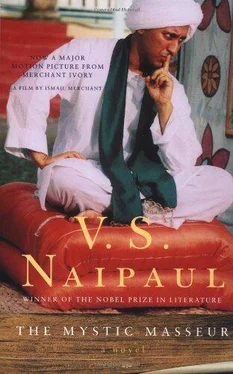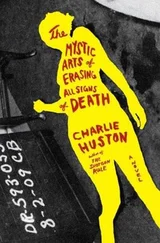V. S. Naipaul
The Mystic Masseur
To the Memory of my Father and for Gordon Woolford
All characters, organizations, and incidents in this novel are fictitious. This is a necessary assurance because, although its politicians have taken to calling it a country, Trinidad is a small island, no bigger than Lancashire, with a population somewhat smaller than Nottingham’s. In this novel the geography of the island is distorted. Dates are, unavoidably, mentioned; but no actual holder of any office is portrayed. The strike mentioned in Chapter Twelve has no basis in fact.
1. The Struggling Masseur
LATER HE WAS TO BE famous and honoured throughout the South Caribbean; he was to be a hero of the people and, after that, a British representative at Lake Success. But when I first met him he was still a struggling masseur, at a time when masseurs were ten a penny in Trinidad.
This was just at the beginning of the war, when I was still at school. I had been bullied into playing football, and in my first game I had been kicked hard on the shin and laid up for weeks afterwards.
My mother distrusted doctors and never took me to one. I am not blaming her for this because in those days people went by preference to the unqualified masseur or the quack dentist.
‘I know the sort of doctors it have in Trinidad,’ my mother used to say. ‘They think nothing of killing two three people before breakfast.’
This wasn’t as bad as it sounds: in Trinidad the midday meal is called breakfast.
My foot was hot and swollen, and getting more and more painful. ‘So what we going to do?’ I asked.
‘Do?’ my mother said. ‘Do? Give the foot a little more time. You never know what could happen.’
I said, ‘ I know what going to happen. I going lose the whole damn foot, and you know how these Trinidad doctors like cutting off black people foot.’
My mother grew a little worried and she made a large mud-plaster for the foot that evening.
Two days later she said, ‘It looking a little serious. Is only Ganesh now for you, boy.’
‘Who the hell is this Ganesh?’
This was a question many people were going to ask later on.
‘Who is this Ganesh?’ my mother mocked. ‘ This Ganesh? You see the sort of education they giving you children these days. Your foot break up and hurting, and still you talking about this man as though you is his father when the man old enough to be your father.’
I said, ‘What he does do?’
‘Oh, he does cure people.’
She spoke in a guarded way and I felt that she didn’t want to talk too much about Ganesh because his gift of healing was a holy thing.
It was a long drive to Ganesh’s, more than two hours. He lived in a place called Fuente Grove, not far from Princes Town. Fuente Grove — Fountain Grove — seemed a curious name. There was no hint of a fountain anywhere, no hint even of water. For miles around the land was flat, treeless, and hot. You drove through miles and miles of sugar-cane; then the sugar-cane stopped abruptly to make room for Fuente Grove. It was a sad little village, just a dozen or so thatched huts strung out on the edge of the narrow lumpy road. Beharry’s shop was the one sign of a social life and we stopped outside it. It was a wooden building, dingy distemper flaking off the walls and the corrugated-iron roof warped and rusted. A little notice said that Beharry was licensed to sell spirituous liquors, and I could see the man so privileged — as I thought — sitting on a stool in front of the counter. Spectacles rested on the tip of his nose and he was reading the Trinidad Sentinel at arm’s length.
Our taxi-driver shouted, ‘Ai!’
The paper was lowered. ‘Oi! I is Beharry.’ He slid off the stool and began rubbing the palms of his hands over his little belly. ‘Is the pundit you looking for, not so?’
The taxi-driver said, ‘Nah. We come all the way from Port of Spain just for the scenery.’
Beharry was not prepared for this incivility. He stopped rubbing his belly and started to tuck his vest into his khaki trousers. A big woman appeared behind the counter and when she saw us she pulled her veil over her head.
‘These people want to find out something,’ Beharry told her, and went behind the counter.
The woman shouted, ‘Who you looking for?’
My mother replied, ‘The pundit we looking for.’
‘Just go down the road a little bit,’ the woman said. ‘You can’t miss the house. It have a mango tree in the yard.’
The woman was right. We couldn’t miss Ganesh’s house. It had the only tree in the village and it looked a little better than most of the huts.
The driver honked the horn and a woman appeared from behind the house. She was a young woman, big-boned but thin, and she was trying to give us some attention and shoo away some fowls with a cocoye broom at the same time. She examined us for a while and then began shouting, ‘Man! Eh, manwa!’
Then she looked hard at us again and pulled her veil over her head.
She shouted again, ‘Eh, eh, you ain’t hear me calling you? Man! Eh, manwa!’
A high voice came fluting out of the house. ‘Yes, man.’
The driver turned off the engine and we heard sounds of shuffling inside the house.
Presently a young man came out on the small verandah. He was dressed in the ordinary way, trousers and vest, and I didn’t think he looked particularly holy. He wasn’t wearing the dhoti and koortah and turban I had expected. I was a little reassured when I saw that he was holding a big book. To look at us he had to shelter his eyes from the glare with his free hand, and as soon as he saw us he ran down the wooden steps and across the yard and said to my mother, ‘Is nice to see you. How is everything these days?’
The taxi-driver, now curiously correct, was staring at the heat waves jigging up from the black road, and chewing on a matchstick.
Ganesh saw me and said, ‘Ooh, ooh, something happen to the boy.’ And he made a few sad noises.
My mother got out of the car, straightened her dress, and said, ‘You know, Baba, how children getting out of hand these days. Look at this boy.’
All three of them, Ganesh, my mother, and the taxi-driver, looked at me.
I said, ‘But what happen that all you people looking at me so for? I kill priest?’
‘Look at this boy,’ my mother said. ‘You think he make for any rough game?’
Ganesh and the taxi-driver shook their heads.
‘Eh, eh,’ my mother continued, ‘look at my crosses one day. I see the boy coming home limping. I say, “What happen that you limping, boy?” He answer me back brave brave like a man, “I was playing football.” I say, “Playing the fool, you mean.” ’
Ganesh said to the taxi-driver, ‘Help me take the boy inside the house.’
As they carried me in I noticed that someone had tried to scratch a little garden into the hard and dusty front yard, but nothing remained now except the bottle-borders and a few tough stumps of hibiscus.
Ganesh looked the only cool thing in the village. His eyes were deep black, his skin was yellowish, and he was just a little flabby.
But nothing had prepared me for what I was to see inside Ganesh’s hut. As soon as we entered my mother winked at me, and I could see that even the taxi-driver was fighting to control his astonishment. There were books, books, here, there, and everywhere; books piled crazily on the table, books rising in mounds in the corners, books covering the floor. I had never before seen so many books in one place.
‘How much books it have here, pundit?’ I asked.
‘I never really count them,’ Ganesh said, and called, ‘Leela!’
Читать дальше












